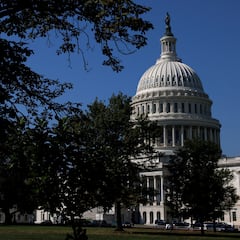Will the US ever pay its debt?
The US national debt will continue to persist as the goal is not necessarily to eliminate it entirely but to manage it responsibly as a means of statecraft.


Another looming government shutdown is coming up. By now, they should probably be pencilled in each year as sure as the Super Bowl final.
These shutdowns come about when the US government has exceeded its limits on borrowing. This borrowing is at the expense of national debt.
"Suddenly [the House GOP's] going to shut down D.C. because of the deficit when they just didn't give a damn a few years ago. As long as it was Trump breaking records, spending us into debt, destroying the longterm health of our economy...they didn't care." --@joenbc pic.twitter.com/l2MyHVxLsb
— Morning Joe (@Morning_Joe) September 14, 2023
The Republican party has historically been keen to position itself as the defender against this debt, which rose significantly during the important spending during covid-19. It is crucial to point out that it is very normal for countries to carry a national debt, especially large and economically developed ones.
What is the national debt?
The US national debt represents the cumulative amount of money the federal government has borrowed over time to cover budget deficits (when expenditures exceed revenues). It includes various types of debt instruments, such as Treasury bills, notes, and bonds, held by both domestic and foreign investors, as well as government agencies.
A critical factor is the debt-to-GDP ratio, which measures the national debt relative to the size of the economy. A high debt-to-GDP ratio can be concerning because it indicates that a significant portion of a country’s economic output is being used to service the debt. Higher debt may dissuade investors as a high debt could indicate economic mismanagement.
At present, the US debt-to-GDP ratio is 122.8%. Anything over 100% could be considered a worry but the US economy is renowned for its security. Though credit ratings have recently been cut, there is confidence that the US is in control of its debt. On the contrary, a nation like Greece with a ratio of 206% is a massive worry. After the Greek crisis of 2008 debt was rampant and horrific spending cuts were implemented.
An important factor to consider when looking at a nation’s debt is that any comparisons to personal debt are not valid. Comparing a nation’s debt to an individual’s debt oversimplifies the complexities of public finance, government operations, and the macroeconomic factors involved.
These two types of debt serve entirely different purposes, but are often used as a comparison for politicians wrongly. If a person does not pay their mortgage, their house will be repossessed. But there is nothing of the equivalent for huge national debt.
Is it necessary for a nation to pay its debt off?
Related stories
Cutting the national debt also means fiscal levers will need to be pulled by the government which cause economic hardship. Most times this means either higher taxes, cutting of spending, or a combination of the two. This has been the rather dull Republican party messaging around the traditional conservative issue. However, various tax cuts from the Trump administration increased the deficit by $2 trillion.
House Republicans, who gladly rubber stamped Trump’s enormous deficit spending — the third highest of any president in US history — are now pretending to be upset about “woke deficit spending” under Biden. https://t.co/v7P9Frknol
— Kevin M. Kruse (@KevinMKruse) September 12, 2023
It is neither necessary for a nation to pay its debt off, nor is it wanted. It is very, very unlikely the US will ever do so though it will be an aim of some politicians to at least reduce. The focus has been on managing it rather than eliminating it entirely.
